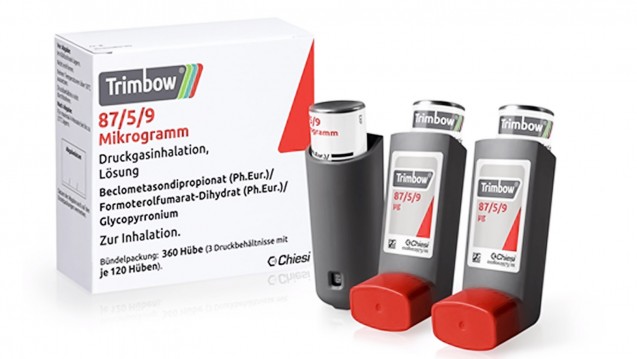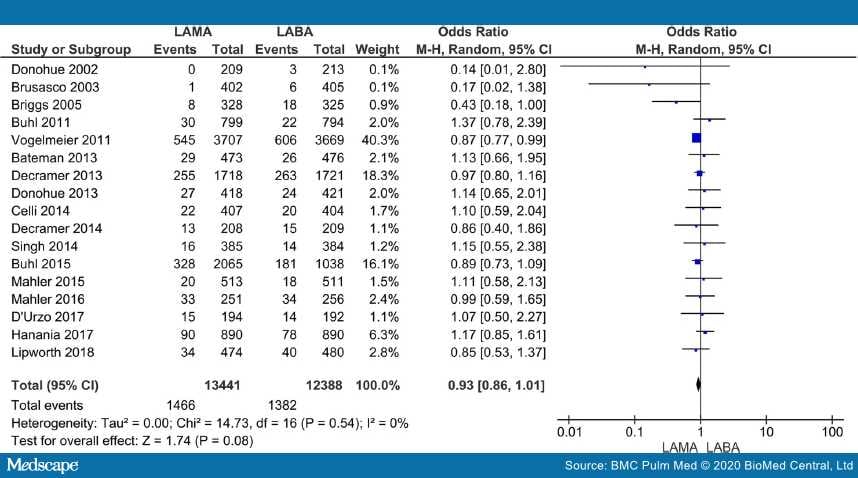

Studies were required to report at least one of the following clinical and health status endpoints: trough FEV 1, transitional dyspnea index (TDI), St George’s Respiratory Questionnaire (SGRQ) and safety (frequency of adverse events ). The eligible study treatments were restricted to all combinations at their licensed doses which were available at the time of review.

Randomized, parallel-group, controlled design studies of ≥12 weeks’ duration, which compared LAMA/LABA FDCs (aclidinium/formoterol 400/12 mcg twice a day, indacaterol/glycopyrronium 110/50 mcg once a day, tiotropium/olodaterol 5/5 mcg once a day, umeclidinium/vilanterol 62.5/25 mcg once a day ), LAMAs (aclidinium 400 mcg once a day, glycopyrronium 50 mcg once a day, tiotropium 18 mcg or 5 mcg once a day, umeclidinium 62.5 mcg once a day ), ICS/LABA FDC (fluticasone/salmeterol 250/50 mcg or 500/50 mcg twice a day, fluticasone/vilanterol 100/25 mcg once a day, budesonide/formoterol 320/9 mcg twice a day ) and SAMA (ipratropium 40 mcg four times a day ) with each other or with placebo were selected if they included adults with stable, moderate-to-very severe COPD. LABA monotherapy was not included in this analysis as it is infrequently used compared to the other classes of inhalers in Singapore. The aim of this network meta-analysis was to comprehensively compare the efficacy and safety of the individual agents under the various therapeutic classes of inhalers commonly used in the treatment of COPD, namely SAMAs, LAMAs, LAMA/LABA fixed-dose combinations (FDCs) and ICS/LABA FDCs. To our knowledge, there is no published systematic review that compares all treatment options. 2 Patients who have persistent symptoms or exacerbations should be treated with a combination of LAMA and LABA (LAMA/LABA) or inhaled corticosteroids (ICS) and LABA (ICS/LABA). 1Ĭurrent disease management guidelines developed by GOLD recommend maintenance therapy with either a long-acting muscarinic antagonist (LAMA) or a long-acting beta agonist (LABA) in patients with moderate or severe COPD (Groups B–D) when short-acting muscarinic antagonists (SAMAs) fail to control symptoms and exacerbation rates. It is the fourth leading cause of death worldwide. COPD is a global health problem that causes substantial morbidity and mortality.

Exacerbations often occur, where there is a rapid and sustained worsening of symptoms beyond normal day-to-day variations. The impairment of lung function is usually progressive and is not fully reversible. It is predominantly caused by smoking however, other factors, particularly occupational exposures, may also contribute to the development of COPD. However, further studies comparing umeclidinium/vilanterol FDC (ANORO) to other LABA/LAMA combinations are needed.COPD is a chronic disorder characterized by fixed airway obstruction with accompanying respiratory symptoms such as persistent and progressive breathlessness, chronic productive cough and limited exercise capacity. Clinical data published on the combination of umeclidinium/vilanterol in patients with COPD have shown greater improvements in lung function compared to monotherapies. The search was limited to English language studies on human subjects. Recent and significant clinical trials about the monocomponents and their combination were identified, in addition to reviews, guidelines for COPD, data from manufacturer and FDA product labels. Literature search was done through PubMed (2004-2017) using the terms umeclidinium, vilanterol, COPD, LABA and LAMA. The objective of this study is to evaluate the efficacy and safety of once daily umeclidinium/vilanterol (62.5 mcg/25 mcg) in COPD patients, focusing on pharmacodynamic and pharmacokinetic characteristics, efficacy and safety in clinical studies and cost. Anoro Ellipta (umeclidinium + vilanterol) dry powder inhaler, a fixed-dose combination of LAMA and LABA, was Food and Drug Administration (FDA) approved in 2013 for COPD. Pharmacologic treatment options of COPD are bronchodilators, using either long-acting β2-agonists (LABAs), or long-acting muscarinic antagonists (LAMAs), or a combination of two. Chronic obstructive pulmonary disease (COPD) is a common respiratory disease that is predicted to be one of the leading causes of death worldwide.


 0 kommentar(er)
0 kommentar(er)
